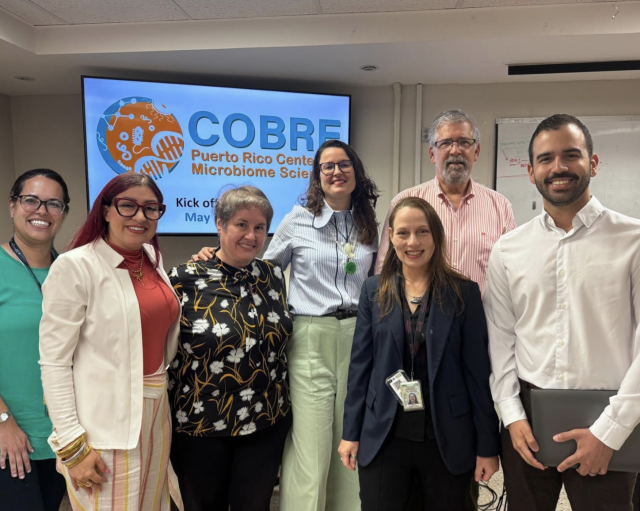Puerto Rico to host the first microbiome research center in the Caribbean
Submitted on 25 June 2025 - 12:00am
This article is reproduced by CienciaPR with permission from the original source.
CienciaPR Contribution:
Original Source:
By:

There is a complex network of microorganisms - such as fungi, bacteria and viruses - in, on and around everyone. Yet research on this small but powerful ecosystem - known as the microbiome - has been fragmented, across different Caribbean institutions.
But now, with the award of a Centers of Biomedical Research Excellence (COBRE) grant, Puerto Rico will have the first center in the region specialized in the study of the microbiome, which will not only support research, but also lead efforts that reach out to communities outside the laboratory.
Specifically, the Medical Sciences Campus (RCM) of the University of Puerto Rico received $11.3 million from the COBRE, assigned to the National Institute of General Medical Sciences of the National Institutes of Health (NIH), to create the Puerto Rico Center for Microbiome Sciences (PR-CMS). This is the third COBRE grant for the island, joining two previous grants related to cancer and neuroplasticity studies. It will be in effect for 15 years.
“This COBRE is the realization of my vision for Puerto Rico to expand studies of the microbiome,” said doctor Filipa Godoy Vitorino, chair of the Department of Microbiology at the RCM School of Medicine and grant applicant. “We will help clarify the role of the microbiome in the health of Puerto Ricans and help multiple generations of researchers,” she added.
Godoy Vitorino was the first researcher to have a microbiome laboratory in Puerto Rico. With the grant, she hopes to support other professionals-at all levels of research-to create their own research projects at their respective institutions. Her plan will be developed through a three-component structure: administration, research, and researcher support.
At the administration level, he explained, there will be workshops, monthly seminars and even an annual microbiome meeting. Beginning in 2026, Godoy Vitorino will bring the PR-CMS together with the other COBRE-funded centers and NIH-supported institutes in Puerto Rico as an opportunity to establish professional contacts across the island. The salary of PR-CMS employees is included in this component.
Frequently, research on this topic is delayed not because of a lack of data, but because of a lack of analysis. Therefore, she said, the PR-CMS research team will help others use their samples to bridge the gap between analysis and publication.
Meanwhile, to expand the impact and breadth of the projects, researchers at various stages of their careers will have the opportunity to understand how to create competitive proposals and, in addition, write scientific articles.
Godoy Vitorino specified that there will be three projects, for now, that will benefit from the PR-CMS: the study of antibiotics in the oral microbiome, led by doctor Stephanie Dorta-Estremera; the impact of the lipid “edelfosina” in the restoration of the intestinal microbiome after an epileptic insult, led by doctor Yancy Acosta Ferrer; and the effect of changes in the gastrointestinal microbiome on sleep and aggression, led by doctor Roberto Rodríguez Morales.
The funds will help the development of these projects by allowing more undergraduate and graduate students to join, he stressed, and emphasized, in passing, that studying the science of the microbiome is not limited to human health.
Godoy Vitorino intends to weave the “One Health” concept - an approach that uses the study of human beings, but also of the environment in which they live - into the research of the PR-CMS. As part of the mission, he seeks to incorporate in a transdisciplinary way ecological, evolutionary and even microbiome studies of architecture. The PR-CMS will have an application for pilot projects to encompass several researchers throughout the island.
As a collaborative effort, the expert hopes to integrate Puerto Rican institutions into the Microbiome Centers Consortium, a network across the United States that accelerates understanding of the microbiome. PR-CMS efforts will also be felt in schools and communities.
In addition to university courses and conferences, community events will serve to provide different points of view on how the microbiome is relevant in everyday life. Recently, he said, there was an event called Feed Your Microbiota, open to the public and organized by the Puerto Rico Trust for Science, Technology and Research, which brought together farmers, pediatricians and even cooks. Godoy Vitorino hopes to organize more events like that.
“There is a lot of value in receiving a grant of this caliber,” he maintained. “These efforts will position Puerto Rico as a regional epicenter in this emerging discipline,” he predicted.
The execution of this project was accelerated by two programs in particular: IDeA Network Biomedical Research Excellence and Research Centers in Minority Institutions of the NIH. Without them, noted Godoy Vitorino, obtaining the grant would not have been possible.







